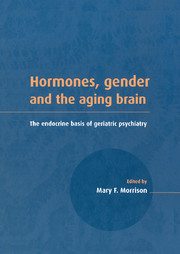Book contents
- Frontmatter
- Contents
- List of contributors
- Preface
- Acknowledgments
- Part I Overview
- 1 Summary chapter. The endocrine basis of geriatric psychiatry: an integrative approach
- 2 Overview of steroids in the aging brain
- Part II Hormones and mental health in the elderly
- Part III Effects of hormones and behavior on immune function
- Part IV Hormones and gender differences in psychotropic drug metabolism
- Index
1 - Summary chapter. The endocrine basis of geriatric psychiatry: an integrative approach
from Part I - Overview
Published online by Cambridge University Press: 18 September 2009
- Frontmatter
- Contents
- List of contributors
- Preface
- Acknowledgments
- Part I Overview
- 1 Summary chapter. The endocrine basis of geriatric psychiatry: an integrative approach
- 2 Overview of steroids in the aging brain
- Part II Hormones and mental health in the elderly
- Part III Effects of hormones and behavior on immune function
- Part IV Hormones and gender differences in psychotropic drug metabolism
- Index
Summary
Introduction
Life is becoming less like a short sprint and more like a marathon.
Kofi Anan, UN Secretary General, October 1, 1998Man is born, grows up and dies according to laws which have never been properly investigated either as a whole or in the mode of their mutual reactions.
Quetelet, 1835The world is rapidly aging. The concept of a few older persons aging successfully into old age was well established at the time of the ancient Greek philosophers, e.g. Socrates, 98 years; Sophocles, 91 years; and Plato, 81 years. In 1900 the average citizen of the United States lived less than 50 years, whereas at the end of the century life expectancy has reached the late seventies. By the year 2030, the percentage of older individuals in the population of most developed nations will be approaching 20%. However, it is not only in the developed nations that persons are living longer. By the year 2000 approximately two-thirds of older persons will live in developing nations, e.g. 300 million in China and 170 million in India.
It is against the backdrop of this age wave that there has been an increasing interest in understanding the scientific basis of the aging process, both physiological and pathological. In the area of mental disorders and aging there have been tremendous advances in our understanding of the pathophysiology of these disorders and an extraordinary development of new therapeutic agents.
- Type
- Chapter
- Information
- Hormones, Gender and the Aging BrainThe Endocrine Basis of Geriatric Psychiatry, pp. 3 - 14Publisher: Cambridge University PressPrint publication year: 2000

